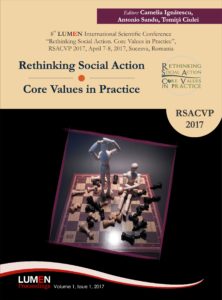Social Effects of Consciousness Theory: Redefining Responsibility according to the existence of the Free Will
Social Effects of Consciousness Theory: Redefining Responsibility according to the existence of the Free Will
Author(s): Viorel Rotilă
Subject(s): Social Sciences
Published by: Editura Lumen, Asociatia Lumen
Keywords: Theory of consciousness; new humanism; free will; responsibility; transhumanism.
Summary/Abstract: The hypothesis of the dependence of our actions on the biological structure of the brain, where a large part of the illegal or immoral actions become explicable through biological or physiological abnormalities, risks throwing into the air both the doctrine of free will and the justification of punishment. At present, the whole system of rules seems to be built on a misunderstanding of the self, and it also affects the presumption of others’ freedom of will. There is evidence that casts doubt on the causal power of consciousness over our actions. The existence of free will seems conditioned by cognitive competence, which most often acquires the image of moral competence. The unequal distribution of cognitive skills affects the free will, so the problem of responsibility. The question of the extent of the avoidable injustice maintained by the legal system becomes legitimate in the context of the lack of adaptation of the legal norms to the new data of science. The neuroscience implications on human responsibility are discussed, opening up one of the contemporary issues: legitimacy of punishment. It is one of the points where science risks demolishing the old social rules, bringing into question the need for strong re-adaptations of the various social sciences in tune with the new discoveries, the moral and the law being at the forefront of change. If the definition of fault is dependent on the possibilities of science then the absence of social diligence in favour of science is a fault of the society. The major problem of scientific interventions in the area of social complexity is the inability to predict their effects, implying the assuming of the risks inherent to the exit from the safety generated by the traditional social solutions, prudence being indicated. The post-humane, trans-humane, super-human, etc. all bring fears upon a humanity that has turned human rationality into the supreme point of orientation of morality and equality into one of the principles of ordering activity. The discussion is about the revolution of the social design of the research on consciousness, the re-establishment of the humane and of the social, namely a new humanism.
Book: Rethinking Social Action. Core Values in Practice
- Page Range: 719-729
- Page Count: 11
- Publication Year: 2017
- Language: English
- Content File-PDF

